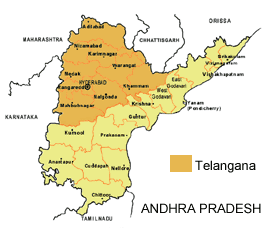 The demand for Telangana state has new takers as the Telugu Desam Party changes tack on the issue.
The demand for Telangana state has new takers as the Telugu Desam Party changes tack on the issue.The decision of the Telugu Desam Party (TDP) to support the creation of a separate Telangana state is a volte face. The decision is also significant because the TDP is the principal opposition party in the state and has hithero vociferously opposed such a move. It is clear that the TDP’s moves are aimed at attracting support in the Telangana region. The TDP had always positioned itself as a party with a base in all the Telugu-speaking regions of Andhra Pradesh.
The TDP split in 2001 leading to the formation of the Telangana Rashtra Samiti (TRS), which renewed the agitation for a separate state but with no returns so far. The TRS alliance with the Congress in the last assembly elections in 2004 had hurt the TDP and the latter’s recent change in position has brought it closer to the Telangana party, thereby creating the possibility of an alliance against the ruling Congress Party in the assembly elections in 2009.
Political calculations apart, the TDP’s about-turn means that the idea of a separate Telangana state now enjoys currency among almost all of the major political parties in the state except for the non-committal Congress, and the Communist Party of India (Marxist) – CPI(M). Even the newly formed Praja Rajyam of the actor Chiranjeevi has recently suggested that it is open to the idea of a separate Telangana.
More than five decades after the state of Andhra Pradesh was constituted by merging the Telugu-speaking areas that were part of the Nizam of Hyderabad’s dominions with the linguistic coterminous areas of Madras Presidency, grievances over lopsided development remain. The Telangana region suffers from inadequate irrigation, higher rates of poverty, poorer health facilities and higher unemployment in comparison to other regions in the state. One of the reasons for underdevelopment is the fact that Telangana inherited a feudal political and economic structure from the days of the Nizam, other reasons relate to the failure by successive governments to implement promised measures in the state.
The persistence of these grievances among the populace of the region has resulted in many a political party eventually coming to support the demand for a separate state. Even the Congress Party, following a Congress Working Committee resolution that was adopted before the 2004 assembly elections, had promised to take up the issue, through the aegis of a second state reorganisation commission to look into the formation of new states. Inaction and indifference by the Congress forced the TRS to break its alliance with the party and withdraw from the United Progressive Alliance. The CPI(M), on the other hand, has consistently rejected the formation of a new state, arguing that the neglect of the region can be rectified by focusing on prioritised development of the backward areas in Andhra Pradesh.
The formation of Andhra Pradesh after a concerted movement marked the beginning of the linguistically determined federal reorganisation process. The coherent division on a linguistic basis has, contrary to the fears expressed in the mid-1950s, helped strengthen the democratic federal framework. Yet, the political institutional set-up and the mode of development (primarily capitalist) within several states have created intra-state disparities. The opposition to the demand for a Telangana state is posited on the logic that the creation of such a state would open a Pandora’s box for other intrastate regional areas to stake their claims for separate states as well. This argument underestimates the alienation of backward regions.
Many grievances gather emotive steam through appeals to cultural differences. That is when the logic of “linguistic coherence” inevitably loses appeal. It is obvious that only a focus on removing disparities can prevent such situations, but it requires political will to address structural inequalities. In the case of Telangana, for example, land reforms and other socio-economic measures to address poverty and semi-feudalism should be the immediate remedy. But with the political leadership more interested in a model of development that is decidedly urban-centric, private investment-driven and engaged only in token welfarism, is it possible to prevent the demand for a new state?
Editorial written for the Economic and Political Weekly
No comments:
Post a Comment